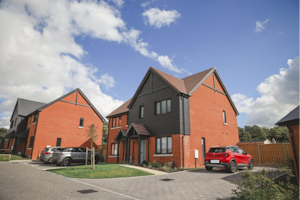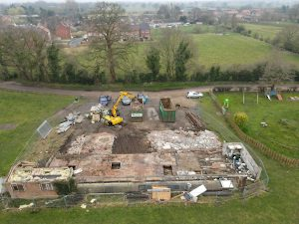T: 01822 851370 E: [email protected]
Visit RSN Survey about life in rural England to find out more.
Spotlight on Rural Housing - January 2025

A quarterly bulletin facilitated by your membership of the Rural Services Network and produced in partnership with the Rural Housing Alliance, highlighting a selection of current rural housing issues and opportunities
Older homes become the most efficient thanks to retrofit programme
 Work to retrofit 400 Broadacres older and least energy efficient homes has now seen them become amongst the most sustainable and environmentally friendly of the housing provider’s entire stock.
Work to retrofit 400 Broadacres older and least energy efficient homes has now seen them become amongst the most sustainable and environmentally friendly of the housing provider’s entire stock.
Over the last 18 months a Government grant of £2.7 million has helped to retrofit 400 homes in areas such as Easingwold, Bedale, Northallerton and Ripon, as well as smaller rural communities such as Great Broughton, Osmotherley and Helperby.
Since work started in April 2023 this has led to:
- solar panels being installed in 400 homes
- air-source heat pumps being installed in 52 homes
- loft insulation being fitted in 156 homes
- floor insulation being fitted in 15 homes
Prior to the work, all the homes in the retrofit programme had an Energy Performance Certificate rating of D, E or F, but now most have achieved a B rating and some have even reached the maximum A rating.
Among those who recently had work completed to their home is Julie Sadler, who lives in the village of Thormanby, between Thirsk and Easingwold. Julie lives in a bungalow with her dog Polly and says after the work to install solar panels, air-source heat pump and larger radiators in October 2024 she has already noticed the difference as autumn turned to winter.
“I have lived here for almost 20 years and until now I had oil-fired heating which was expensive, and I often found myself switching it off regularly in order to save money,” she says.
“I put off getting the solar panels and heat pumps for a while because I was unsure about making the change, but my neighbour got them, and he told me what a difference they had made to his home, so I decided the time was right and now I just wish I done it sooner.”
You can read more at this link.
Revised NPPF published
On 12 December, the Government published its full response to the National Planning Policy Framework (NPPF) consultation. You can read the full government response to the consultation at this link.
In response to one of the consultation questions concerning rural affordable housing, the government had this to say:
“The government is aware of higher costs of delivery in rural areas and we want to see more affordable housing in these areas as part of our ambition to deliver the biggest increase in social and affordable housebuilding in a generation.
“We recognise the strong support that was given to rural exception sites and the potential for encouraging them to be brought forward in greater numbers.
“We are committed to improving the quality of life for people living and working in rural areas. We intend to give further consider to how policy can better promote rural affordable housing and wider exceptions site policy as part of our work to produce a set of national policies for decision making in 2025.”
The Rural Services Network has produced a summary document highlighting initial responses to the published NPPF. It also includes some of the key questions for rural, the RSN response to them and the now published Government response. You can read the RSN document at this link.
Connexus secures £100m investment for new and existing homes
Rural housing association Connexus has secured £100m in investments to support the development of new affordable homes and improve its existing properties.
The investment comprises a £60m private placement with a UK investor, and a further £40m through the Affordable Homes Guarantee Scheme (AHGS).
Connexus worked to arrange the private placement through Lloyds, Savills Financial Consultants, and legal partner Anthony Collins Solicitors. Savills Financial Consultants and Anthony Collins were also involved in the AHGS investment alongside Venn, which manages the scheme on behalf of the UK Government.
The funding will help the West-Midlands based housing association to deliver hundreds of new affordable homes over the next decade as well as supporting major refurbishment programmes, aimed at bringing older homes up to a modern standard.
Kate Smith, Connexus chief executive, said: “These investments are a huge vote of confidence in Connexus, and will help support homes, jobs and the wider economy in our rural heartlands.” For more information contact: [email protected]
Working alongside communities and local authorities critical in providing affordable homes at English Rural
 English Rural Housing Association write: “At English Rural, we put the needs of rural communities at the heart of everything we do. For these communities to thrive and survive, we believe that local people should have access to high-quality homes that are in the right place, comfortable, secure and affordable.
English Rural Housing Association write: “At English Rural, we put the needs of rural communities at the heart of everything we do. For these communities to thrive and survive, we believe that local people should have access to high-quality homes that are in the right place, comfortable, secure and affordable.
“To achieve this at a time England faces an unprecedented housing deficit, we take a collaborative approach in building strong relationships with rural communities and local authorities. This method not only fosters a sense of community but also addresses the unique housing challenges faced by people and families in the countryside.
“As of 2022, only 9% of rural housing stock in England is classed as “affordable,” and the average house price in rural areas is £418,400. Our work aims to combat these statistics head-on.
“One of the key features of English Rural’s strategy is its deep engagement with local people. The process begins with extensive consultations and dialogue with community members to understand their housing needs and concerns; often using the valuable skills of a local Rural Housing Enabler. By establishing an inclusive environment from the earliest steps of development, we can ensure that the voices of local people are heard and considered in the planning, design and build phases.
“Community engagement often involves public meetings, online consultation, surveys, and workshops where residents can express their views and contribute to the planning process. This participatory approach helps build trust and ensures that the housing solutions delivered genuinely reflect the needs of the people they aim to serve. Moreover, it empowers residents by giving them a stake in the development journey, which is crucial for the long-term sustainability of our projects.
“This collaborative approach also extends to English Rural’s relationship with local authorities, which is crucial in providing affordable housing where it is needed most and with access to important services.
“By engaging with local authorities, planning officials and community leaders, we can ensure that the development of high-quality, well-located homes is executed in a timely manner and to the highest standards. These projects not only address immediate rural housing needs but also contribute to the long-term sustainability and vitality of rural areas.
“Utilising innovative design helps English Rural’s homes sit comfortably within the existing built environment, incorporating eco-friendly materials and practice also minimises impact on climate and nature.
“Ultimately, the homes that are built provide a positive boost for the local community, securing a range of benefits both now and for future generations. This comprehensive and collaborative way of working strengthens rural communities, ensuring their resilience and vibrancy for years to come.”
Rural Housing Week 2025 – hold the date
Every year, Rural Housing Week highlights the many social and economic benefits of affordable housing to rural communities.
This year, Rural Housing Week will take place from 7-11 July. Watch out for more information over the coming months.
If you want to see some of the highlights from Rural Housing Week 2024, take a look at this link.
Housing Association community development fund supports new pavilion
 Village halls and pavilions are essential for bringing communities together and Broadacres is among a number of organisations helping a North Yorkshire village to build a new one.
Village halls and pavilions are essential for bringing communities together and Broadacres is among a number of organisations helping a North Yorkshire village to build a new one.
Huby Playing Fields Association were faced with a daunting task when their much loved but dilapidated 60-year-old sports pavilion was finally condemned in 2020 on health and safety grounds. Since then, they’ve had to contend with lockdown, rising costs and the discovery of asbestos in the old building which has all added to the challenge faced.
But they’ve risen to that challenge, with the old building having been demolished and construction of the new pavilion set to commence with a £350 grant from Broadacres Community Development Fund helping out.
Simon Bullough, Chair of the Playing Fields Association, said: “We’ve had help from a wide range of bodies including local councils, businesses and charities and every little helps.”
The village near York has grown in recent years from 1,200 to 1,500 with new homes being built including by Broadacres. A council report concluded the need for a community resource was ‘desperate’.
“The pavilion is a vital resource for the community. If you lose that you lose the sports clubs, the community gatherings and the hub that brings the village together,” said Simon.
“The growth of the village makes the need for social infrastructure even greater and with the old building demolished and planning application in for the new pavilion the community can see that, after years of discussion, something is now happening.”
The Broadacres Community Development Fund supports local organisations, groups, and projects in areas where Broadacres has homes. All grants are approved by the Association’s own residents. You can read more at this link.
Cup of communi-tea
 In the war against loneliness, there’s nothing quite so powerful as a good cuppa. That’s the idea behind the Inclusion Cafe, where residents of rural housing provider Connexus can come together to combat loneliness.
In the war against loneliness, there’s nothing quite so powerful as a good cuppa. That’s the idea behind the Inclusion Cafe, where residents of rural housing provider Connexus can come together to combat loneliness.
According to a recent Age UK survey, loneliness is a major concern among over 65s – one in 14 are lonely, with 270,000 going a week or more without talking to a friend or family member.
Loneliness is harmful to older people’s health, wellbeing and quality of life, with links to acceleration of frailty, and increased risk of mental and physical illness. This includes higher rates of coronary heart disease, strokes and dementia.
The cafe is the brainchild of Bryngwyn Court resident, Maggie Byram. Bryngwyn Court is one of three Connexus run independent living schemes in Hereford. Serving light lunches, cakes and tea or coffee in the Court’s communal area, it’s an opportunity for the residents from the three schemes to come together, enjoy a homecooked lunch, and chat.
Residents can invite their families to come and join them for lunch, and takeaways are provided for residents who are working or unable to attend in person. The café is staffed by volunteers, and to help keep costs down the residents have started a community garden to grow salad, fruit and vegetables. All the money raised goes directly back into covering running costs.
Maggie is delighted with its success and said: “I’ve always wanted to run a cafe, so this is a dream come true for me.”
For more information, contact: [email protected]
Podcast: Listen to English Rural Chief Exec Talk About The Challenges & Opportunities For Affordable Rural Housing
You can listen to English Rural Chief Exec, Martin Collett, talk about the challenges and opportunities for affordable rural housing in this Future Economic Rural Network podcast at this link.
Martin discusses a range of matters, ending with a call to action noting: “A thriving rural community needs a mix of incomes and age groups. This requires a collective effort from policymakers, developers, and local communities.”
Heat Network Efficiency Scheme open for applications
The Heat Network Efficiency Scheme (HNES) from the Department for Energy Security & Net Zero provides funding to public, private and third sector applicants in England and Wales to support improvements to existing district heating or communal heating projects that are operating sub-optimally and resulting in poor outcomes for customers and operators.
It is a £80 million grant support programme spanning years 2023-2024 to 2027-2028.
Applications for Round 9 are now open and will close on 28 March 2025. You can find all the details at this link.
Keep Calm and Join Up!RSN exists to enable the issues facing the rural areas of England to be identified, information and good practice to be shared and government to be challenged to address the needs and build on the opportunities which abound in rural areas. If you know a rural housing organisation that would benefit from membership, please ask them to consider joining us. RSN is a solely rural focussed organisation with an electronic distribution network in excess of 20,000 individuals. We reach right across all the rural areas of England and provide a sustained and respected voice for rural areas at national level. Anyone who wants to talk to us about our role and services in relation to rural housing should contact Andy Dean to find out more. |



